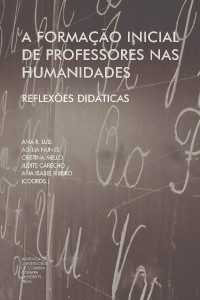Please use this identifier to cite or link to this item:
https://hdl.handle.net/10316.2/47631| DC Field | Value | Language |
|---|---|---|
| dc.contributor.author | Luís, Ana R. | |
| dc.date.accessioned | 2019-11-26T11:36:30Z | |
| dc.date.accessioned | 2019-12-18T17:56:18Z | - |
| dc.date.available | 2019-11-26T11:36:30Z | |
| dc.date.available | 2019-12-18T17:56:18Z | - |
| dc.date.issued | 2019 | |
| dc.identifier.isbn | 978-989-26-1701-5 (PDF) | |
| dc.identifier.isbn | 978-989-26-1700-8 | |
| dc.identifier.uri | https://hdl.handle.net/10316.2/47631 | |
| dc.description.abstract | Tomando como ponto de partida o debate sobre o uso de materiais autênticos em sala de aula, este trabalho coloca lado a lado as perspetivas que se têm delineado desde a década de 1970 no ensino de Inglês. Será nosso propósito mostrar que, apesar de reinar um amplo consenso quanto aos benefícios da utilização de textos autênticos, é possível apresentar argumentos a favor da adaptação do texto autêntico através do recurso à simplificação ou elaboração linguísticas que visam tornar os textos acessíveis a diferentes níveis de aprendizagem. Com recurso a exemplos práticos, dirigidos prioritariamente a professores de Inglês em formação inicial, serão apresentadas orientações metodológicas que podem auxiliar na seleção, preparação e avaliação de textos em língua inglesa. | por |
| dc.description.abstract | Taking as a starting point the debate on the authenticity of teaching materials in English language teaching, this work offers a survey of the views that have been formulated since the 1970s. It will be our goal to show that, although there is a broad consensus about the benefits of using authentic texts, it is important to bear in mind that numerous studies have also provided arguments in favor of the adaptation of authentic texts by means of linguistic simplification or elaboration. By providing practical examples, we offer guidelines which may help pre-service teachers (in Initial Teacher Education) in their selection, production and evaluation of English teaching materials. | eng |
| dc.language.iso | por | por |
| dc.publisher | Imprensa da Universidade de Coimbra | por |
| dc.relation.ispartof | http://hdl.handle.net/10316.2/47620 | por |
| dc.rights | open access | por |
| dc.title | A adaptação linguística no ensino de inglês: exemplos de simplificação e de elaboração | por |
| dc.title.alternative | The linguistic adaptation of English texts: illustrating simplification and elaboration | por |
| dc.type | bookPart | por |
| uc.publication.location | Coimbra | por |
| uc.publication.pages | 195-212 | por |
| dc.identifier.doi | https://doi.org/10.14195/978-989-26-1701-5_9 | |
| uc.publication.section | Parte 3 - Ensino de Línguas Estrangeiras | por |
| uc.publication.area | Artes e Humanidades | por |
| dc.subject.por | leitura | por |
| dc.subject.por | texto | por |
| dc.subject.por | literatura | por |
| dc.subject.por | adaptação | por |
| dc.subject.por | autenticidade | por |
| dc.subject.por | ensino da língua inglesa | por |
| dc.subject.eng | reading | por |
| dc.subject.eng | texts | por |
| dc.subject.eng | literature | por |
| dc.subject.eng | adaptation, | por |
| dc.subject.eng | authenticity | por |
| dc.subject.eng | English language teaching | por |
| uc.publication.bookTitle | A formação inicial de professores nas humanidades: reflexões didáticas | por |
| item.fulltext | With Fulltext | - |
| item.grantfulltext | open | - |
| Appears in Collections: | Nova Pombalina | |
Files in This Item:
| File | Description | Size | Format | |
|---|---|---|---|---|
| A_adaptacao_linguistica_de_textos_em_lingua_inglesa.pdf | 645.86 kB | Adobe PDF |  |
Items in DSpace are protected by copyright, with all rights reserved, unless otherwise indicated.
